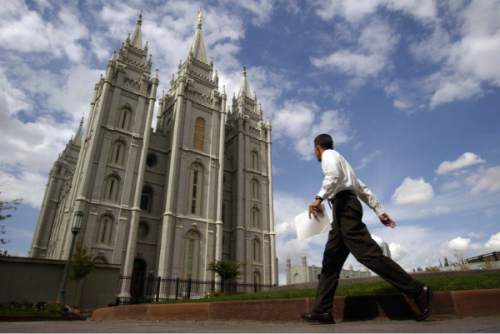This is an archived article that was published on sltrib.com in 2016, and information in the article may be outdated. It is provided only for personal research purposes and may not be reprinted.
Since the LDS Church has weighed in on two important bills before the Legislature that likely now will fail because of the faith's statements, here is what Article I, Section 4, of the Utah Constitution says:
"There shall be no union of Church and State, nor shall any church dominate the State or interfere with its functions."
First, the LDS Church issued dual statements opposing a bill that would allow the use of medical marijuana in treatment of patients with various ailments. The measure's sponsor, Sen. Mark Madsen, R-Saratoga Springs, expressed fear the church's statement effectively kills his bill. Madsen is a Mormon.
The Salt Lake City-based faith then issued a statement implying its opposition to a hate-crimes bill that includes gays and lesbians as a protected class. That measure's sponsor, Sen. Steve Urquhart, R-St. George, held a news conference in which he said the church probably snuffed out his bill as well. Urquhart, too, is a Mormon.
While the church has issued no orders or edicts forbidding the bills' passage, it doesn't need to. The mere expression of its opposition is enough to douse legislation and, therefore, set policy.
The Church of Jesus Christ of Latter-day Saints has every right to state an opinion. But it alone seems to have the power to set policy by just stating its opinion.
You've come a long way, baby? • At least the LDS Church issued public statements about the medical-marijuana and hate-crimes bills so everyone knows the power it holds over legislators if those proposals, as now expected, go down to defeat.
The church didn't used to be so transparent.
In the mid-1980s, the Legislature was weighing a bill that would exempt hired limousine drivers and the so-called "fun buses" taking revelers to Wendover from the open-carry law that barred having an opened alcoholic beverage inside a moving vehicle.
The legislation had the support of the state economic-development office, the tourism office, the governor and law enforcement. The idea was that it would help limo and tourism businesses boost Utah's image among out-of-state travelers and, more important, keep alcohol out of the hands of drivers by putting the drinkers in the passenger seats.
The bill breezed through the House. But it stayed in the Senate Rules Committee until the session's last day.
When it finally came up on the board for a possible vote, one senator asked to have the bill circled — delaying any action — while he researched the policy in surrounding states.
And that was the end of the bill. It died without a vote when the clock struck midnight.
It turned out that two lobbyists for the LDS Church, which had never taken a public position on the measure, called two senators in the session's waning hours: the senator who moved to circle the bill and the Senate president who would not recognize any senator trying to uncircle it.
Those were the only two senators contacted by the church, and it was done secretly. The proposal vanished; the church's fingerprints were wiped clean.
So the church's public statements that can kill bills may be seen, in some way, as progress.



